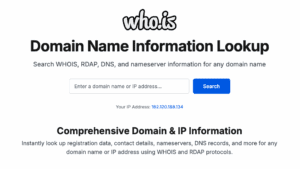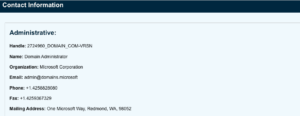Domain brokers like NameExperts.com help clients buy ‘premium’ domains – but what is a premium name, and how do you get one? In this post, domain name specialist Joe Uddeme lifts the lid on high-value web addresses.
Imagine a business today that didn’t have a website. Seems almost inconceivable, right? The internet is one of a business’ primary channels to entice potential customers, meaning any organization that doesn’t have an online presence is massively missing out.
The best way to showcase yourself online is by having a website stating clearly what you or your organization offers. And the way to do that? With a premium domain name.
The domain name is how people will find you on the web, so unless you strike it luck and some cheap random jumble of letters you’ve bought as a domain name suddenly becomes in vogue, you’ll need to dig deep and buy a premium domain name.
But what are the elements of a premium domain – and how much are you going to have to pay? Read on for the full details.
Key Takeaways
- Understanding what premium means in the domain name world
- Elements of a premium domain
- How to buy a premium domain name
- Why you should buy a premium domain
What are Premium Domains?
Premium domain names are high-quality domain names, giving you greater recognition on the internet. They’re often short, catchy, and memorable. They’re the domain names that people are likely to search for and trust over other names.
A premium domain name would go a long way in drawing organic traffic to your website. They’re usually costly, but one of the best investments you can make.
It’s not a coincidence that most of the successful online businesses we know have premium domain names – see Stripe.com, Amazon.com, Google.com and other big-hitters.
How Do You Know if a Domain Name is Premium?
The easiest way to determine if a domain name is premium is the price you see when you search for it for a domain registrar. Likewise, you can use a premium domain checker for this task.
Premium domain names often range from a few hundred dollars to thousands or tens of thousands. They can go for even larger sums – as our post about the most expensive domains ever sold illustrates.
There are also specific characteristics differentiating premium domain names from the pool of all domains, and they include:
Length
“The shorter the name, the better” is the rule of thumb when it comes to domain names. Most two or three-letter domains are considered premium because they’re easy to imprint on customers’ minds.
These short names are also usually abbreviations adopted by various companies, so there’s intense competition for them.
Generic Value
Domain names consisting of generic words fetch a higher value than those with non-generic words. Generic names are easy to remember and brand, so there’s significant demand for them.
You’d have an advantage over competitors if your domain name consists of a word that broadly relates to your industry.
For example, Checkout.com, Bill.com, and Authorize.net are leading payment providers. Crypto.com and Blockchain.com are two famous cryptocurrency exchanges.
Customers need little effort to memorize such generic domain names, so it gives these companies a significant marketing advantage compared to their peers.
Search engine optimization
Search engines are the primary way people discover websites. Hence, any domain name matching what people mostly search for carries more weight.
CreditCards.com, HouseRepairs.com, and RentalCars.com are examples of domain names with high value stemming from search engine optimization.
Buyer Demand
Some domain names don’t look attractive at first glance but see great demand from prospective buyers for various reasons. These domains command high values because of the bidding war over them.
Numerous domain registrars let you check for available domain names, and it’s easy to identify the premium ones based on their prices and the other factors stated above.
If the domain name you want is already taken, don’t give up. You could still acquire it by making a direct offer (more on that below).
How Do You Get a Premium Domain?
The first step to buying a premium domain name is knowing if it’s available using a premium domain checker. You can buy it straight away if it is. If not, you’ll need to find the owner.
Many domain names are registered but not utilized to a considerable extent. Sometimes, you’ll see a homepage filled with advertisements and affiliate links but hardly any content.
This is an attempt by the owner to monetize what’s basically an abandoned site. If you encounter such a website, then it’s positive news for you. The owner is more likely to sell than someone actively hosting a site and doing good business.
If the website has a contact form, you can use it to reach out to the owner with an offer. If not, you must get creative in finding them. The easiest way to do this is through the WHOIS database.
It is a public database containing the information collected when someone registers a domain name or adjusts their DNS settings. ICANN, or the International Corporation for Assigned Names and Numbers, regulates the WHOIS database.

Searching the WHOIS database
ICANN allows anyone to search its public database for domain name ownership information. You can do that through the agency’s online lookup tool or your PC’s command prompt.
Searching WHOIS Online
The official URL of ICANN’s WHOIS lookup tool is lookup.icann.org. Once you open that page, you’ll see a search bar where you can type in any domain name and press the lookup button. We searched for Microsoft.com to demonstrate, and we got the results shown below:

You can see the email assigned to Microsoft’s domain name is [email protected]. Hypothetically, we can contact that email with an offer for the Microsoft.com domain name, but we’re pretty sure the well-known technology company isn’t willing to sell.
Searching WHOIS via Command Prompt
Searching WHOIS through your Windows command prompt is a complex process, so we recommend that only computer geeks take this route.
Step 1:
Download the whois.exe file from this link.
Step 2:
Open the command prompt terminal.
Step 3:
Set the command prompt directory to the folder where you save the whois.exe file.
Step 4:
Type in your query in the following format: Whois domain.com or Whois64 domain.com if you’re running a 64-bit computer. If you want to search for Microsoft’s domain name info, then type Whois Microsoft.com, and you’ll see the contact information.
Sometimes, a domain name owner may have enabled privacy protection through their registrar, meaning you can’t see their information. It implies that they’re likely not interested in selling their domain.
With the contact information, it’s time to negotiate a domain name sale. The process can be hectic and take long periods, so we advise you to hire an experienced domain name broker to help you.
Why Should I Buy a Premium Domain Name?
A premium domain name carries more authority on the web, meaning you’re more likely to get found through search engines or social media. It also brings about better brand recognition, making it easy to attract customers through advertisements.
Many domain registrars have a premium domain checker for their users to find and bid for premium domains without stress. Examples include Name.com and Domain.com.
Who Owns Premium Domain Names?
Anybody or any organization can own a premium domain name. Some are owned by business-savvy people or companies looking to flip them for a profit. Some are owned by domain name registrars themselves hoping to find buyers.
How Do You Value a Premium Domain?
There are various factors to consider when valuing a domain name. They include length, how generic they are, search engine recognition, and historical domain name sales data.
There are numerous appraisal tools available online that combine these attributes to value individual domain names. A good example is GoDaddy’s Domain Name Value & Appraisal tool.
Why are Premium Domains So Expensive?
The price of premium domains can be high because there’s considerable demand for them. The number of premium domain names is significantly less than the number of potential customers vying for them. Hence, premium domain owners can charge high prices and still make easy sales.
As professional domain name brokers, this is the world we live in – and we help people buy and sell premium domains globally every week. Clients choose us for our years of experience – it means we can help them get hold of names that seem impossible to purchase.
Our expert negotiation skills often save clients large sums of money, too.

About the author
Joe Uddeme is Director and Principal of Name Experts, one of the world’s leading domain name brokerage services. He has overseen domain name sales and acquisitions totaling more than $150 million and is renowned worldwide as a go-to expert in buying and selling premium domains. Contact us at: [email protected]







